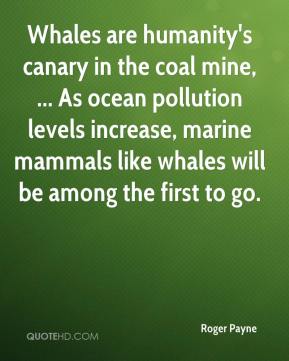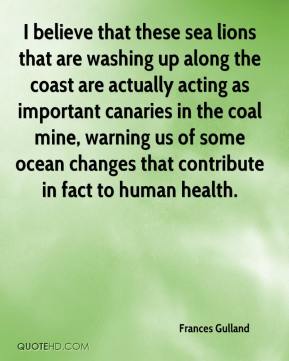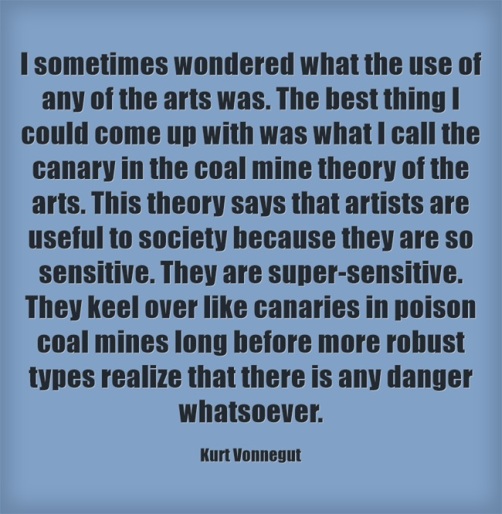Fumes seep and spiral,
Canaries in the coal mine
Chirp their last faint song.
∼
RonovanWrites’ prompts of the week (trill and final) made me think of canaries in a coal mine. Initially, I had an image of canaries singing to warn of danger. However the canary warning is not their chirping–it’s their death. Miners used to bring caged canaries into mines to warn them of dangerous gas leaks. When their feathered friends passed out, they knew it was time to get out of the mine.
As Wednesday is the day I do a quotations post, I searched for a ‘canary in the coal mine’ quote. I was not disappointed. I found three interesting candidates–the first two have an environmental theme and the third one offers artistic inspiration.

“Whales are humanity’s canary in the coal mine,…As ocean pollution levels increase, marine mammals like whales will be among the first to go.”
Roger Searle Payne (born January 29, 1935) is an American biologist and environmentalist famous for the 1967 discovery (with Scott McVay) of whale song among humpback whales. Payne later became an important figure in the worldwide campaign to end commercial whaling.

“I believe that these sea lions that are washing up along the coast are actually acting as important canaries in the coal mine, warning us of some ocean changes that contribute in fact to human health.”
Dr. Frances Gulland is the Director of Veterinary Science at the Marine Mammal Center in Sausalito, CA. Dr. Gulland has been actively involved in the veterinary care of stranded marine mammals and research into marine mammal diseases since 1994.

“I sometimes wondered what the use of any of the arts was. The best thing I could come up with was what I call the canary in the coal mine theory of the arts. This theory says that artists are useful to society because they are so sensitive. They are super-sensitive. They keel over like canaries in poison coal mines long before more robust types realize that there is any danger whatsoever.”
What do you think about Kurt Vonnegut’s theory? I believe he was pondering human survival and asking ‘how do the arts promote the survival of humankind?’ His answer, quoted above, is that artists (writers, painters, photographers, dancers, actors, musicians, etc) are more sensitive; in touch with feelings, senses, imagination, intuition, and such. Artists notice more of what is going on in the world.
A bit elitist or grandiose? Perhaps, but Vonnegut may have been onto something. Another approach would be to attribute sensitivity to artistic endeavour rather than to those who pursue it full-time. In other words, people are more fulfilled and aware when they can incorporate the arts into their lives. We all have the potential to be canaries in the coal mine.
Kurt Vonnegut, Jr. (November 11, 1922 – April 11, 2007) was an American novelist known for works blending satire, black comedy, and science fiction.

In the mood for more quotes? Visit RonovanWrites and SilverThreading.
Love the Vonnegut quote! Good match to your inspired haiku!
LikeLiked by 1 person
Thank you 🙂
LikeLiked by 1 person
A very interesting, and well written piece.
LikeLiked by 1 person
Thank you–glad you enjoyed it.
LikeLiked by 1 person
Very interesting post Janice, loved all the quotes you used .
LikeLiked by 1 person
It’s funny how the haiku prompts even helped me with the Wednesday quote challenge this week.
LikeLiked by 1 person
I checked “like” but I am, of course, saddened by thinking of those poor birds, like those poor humans, trapped in those mines. And, yes, I think we are all canaries now.
LikeLiked by 1 person
Yes the deaths of birds and humans in mining is sad.
LikeLiked by 1 person
A powerful haiku Janice to be read in many ways. I go past the environmental messages and see the American people preparing for what may be their most significant election in history
LikeLiked by 1 person
I like that election take on it 🙂
LikeLike
Great and Thought-provoking post, Janice. I’m still pondering over The Kurt Vonnegut quote – since the arts are very much alive and flourishing does that mean the world isn’t in too bad a state?
LikeLiked by 1 person
Well flourishing arts is always good I would think — but survival depends on us heeding signs and signals before it’s too late.
LikeLiked by 1 person
Interesting ideas! Enjoyed your Haiku.💚❤️💛💜💙
LikeLiked by 1 person
Thank you 🙂
LikeLike
What a thoughtful post and the quotes are fabulous! I think the pursuit of the arts used to be used as a way of distinguishing the educated elite from the working men. I could be reaching here, but I think the arts also produce free thinking. I loved your haiku too, Janice. Well done!
LikeLiked by 1 person
Thanks Colleen. There is so much to the quotes we find–meanings that we apply may be slightly (or greatly ) different from the thinking of the original speaker.
LikeLiked by 1 person
I have to say I have mixed feelings about Kurt’s quote. There is a truth I believe to what he is saying, but the real issue I take with it is that it diminishes the value of the creative process in and of itself. What he is in effect doing is looking at the arts through an utilitarian & mechanization lens and thus reaffirming it, the same lens that keeps us having to keep fighting to keep arts (and the humanities) in the school system.
I think he is also reinforcing a notion (which plays into the utilitarian & mechanization lens) that there are people who are artists and there are those who are not artists, as if it were one of many “career” or occupations choices: Do you want to be a dentist, a human resource specialist or an artist? Everyone is an artist for everyone has the flow of creativity in them.
There are some who make a living through their arts, and some make some money through the arts, yet this is irrelevant to quality or authenticity of their work or their creative process.
I guess I’ll just wrap it up by saying that we wouldn’t need the canary artists if our culture embraced and cultivated the artist which resides in each of us in the community.
LikeLiked by 1 person
Yes, I was trying to get that last point in my mind and words. You laid it out well. Our society tends to undervalue creativity in general and relies too heavily on markers such as money and critical acclaim. That which is recognized has value but it shouldn’t negate value in everything else. I have to stop now but I’ll come back.
LikeLiked by 1 person
Thank you so much for your thoughts on the quote. To the extent that he was buying into a utilitarian discourse I too would object. Our culture tends to dismiss the value of being expressive and creative.
LikeLiked by 1 person
Vonnegut is on to something here. Excellent Haiku and quotes.
LikeLiked by 1 person
Glad you enjoyed the post :))
LikeLiked by 1 person
A very interesting and thoughtful post, Janice. Reflecting on the health of the oceans and life dependent on them, I think the warning signs continue and are not effectively dealt with by governments. I still wonder about the evolving disastrous effects on the Pacific Ocean from the nuclear waste that had flowed continuously from the Japanese nuclear catastrophe. I hear wild salmon are already showing signs. Sad state of affairs!
LikeLiked by 1 person
Yes it is a sad state of affairs. Mind boggling at times.
LikeLiked by 1 person
I like the artist/canary analogy. I had heard of canary death as a warning to coal miners, but I didn’t know it was extended to whales and sea lions. Interesting. Glad to stuff that in my book of knowledge (brain).
LikeLiked by 1 person
Glad you found the post interesting 🙂
LikeLike
Very interesting and necessary post, Janice. Your haiku is beautiful and sad. I love your use of the prompt words. The quotes are fantastic. It always makes me sad to read about animals dying and suffering because of pollution and basically the greed and carelessness of human beings but it’s great that you’re creating awareness.
LikeLiked by 1 person
Yes, the stories are sad…that’s why I generally focus on positive things that are happening or could happen. Glad you ‘enjoyed’ the post.
LikeLiked by 1 person